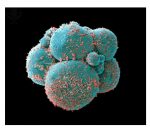A new take on the epigenetic signatures of prenatal stress
The conditions encountered in the womb can have life-long impact on health. It is usually assumed that this is because embryos respond to adverse conditions by programming their gene expression. In collaboration with Bas Heijmans and others, we propose that these effects also can be caused by selection on stochastic epigenetic variation. The paper is published in Cell Reports and there is also a press release.
The concept of fetal programming is based on the idea that embryos modify their physiology in response to the uterine environment. This may be good if conditions stay as predicted. But it may have negative health effects later in life if the conditions change. The concept of programming has been backed up by associations between adverse prenatal conditions and patterns of DNA methylation – an epigenetic mark that regulates gene expression.
Our simple insight is that the uterine environment does not need to induce changes in DNA methylation for this association between adverse prenatal conditions and DNA methylation to arise. In the early embryo, stochastic differences in gene expression can become stabilized by DNA methylation, resulting in embryos with different epigenomic profiles. Not programmed by the environment, these random differences in gene expression (and hence DNA methylation) may nevertheless provide some embryos with a survival advantage when conditions are harsh. In other words, adverse maternal conditions may impose selection on random variation in DNA methylation.
 Human embryo at 8-cell stage. (C) Yorgos Nikas/Science Photo Library
Human embryo at 8-cell stage. (C) Yorgos Nikas/Science Photo Library
We used a mechanistic simulation model to illustrate how selection reduce DNA methylation variance at loci that influence implantation success. The prediction fits very well with empirical data from offspring conceived during the Dutch Hunger Winter, a famine at the end of World War II. This makes selection on stochastic epigenetic variation a reasonable explanation for the epigenetic signatures of prenatal exposure to adverse conditions.
This new hypothesis is not only of academic interest. Fetal programming implies that the behaviour or physiology of the mother causes the offspring phenotype to change. In contrast, a selective process does not bring new phenotypes into being, it changes the distribution of already existing variants. This difference may influence which preventive strategies and treatments that are most likely to be effective. That different mechanisms can be responsible for the same pattern is also relevant to society. As Sarah Richardson has pointed out, careless discussion of epigenetic research on how early life affects health across generations could be harmful.
Read More
